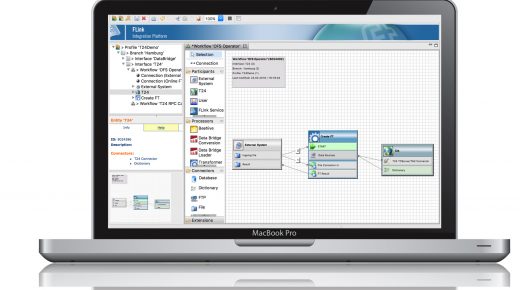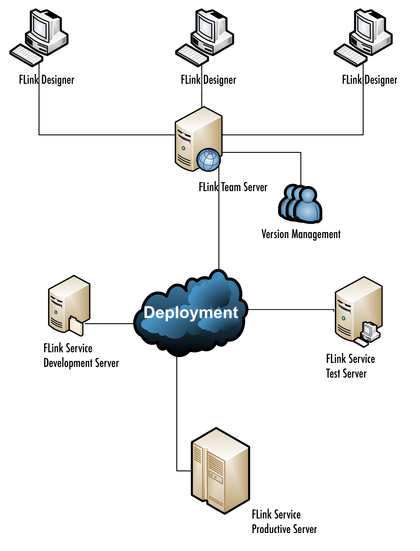
FLink Integration Platform orchestrates interactions and communication between different servers and applications and provides real-time visibility and control about strategic business processes. The grafical user interface allows to adapt business processes to a technical level without the need of programming a single line of code. Predefined connectors and operators hide the technical details and can be used to build fully automated workflows. A runtime component ensures high performance and flexibility when deploying the designed interfaces and workflows into production.
FLink Designer
- GUI Based workflow modelling
- Workflow simulation and test
- Team development
- Workflow version management
- Integrated runtime distribution component
- Monitoring of runtime component
FLink Service
- Powerful runtime environment
- Platform independent
- Automated data transfers
- Data mappings and transformation
- Logging mechanisms
FLink Support
- Extensive product documentation
- Prebuilt workflow templates
- Product Maintenance
- Training and Best Practice
- Project support
Connectors
- Webservices, Sockets, JMS
- Databases
- File, FTP, SFTP
- SAP
- ISO8583, Reuters, FIX Protocol
OPC/UA Connectivity
- Access to OPC/UA node tree
- Read / Write variables
- Function calls
- Subscribe to events
- Webservice / OPC.TCP
Transact (T24) Connectivity
- Access to Temenos Transact (T24) Dictionary
- OFS online
- Function / Enquiry calls
- TAFC / TAFJ
- Supported releases from R7 to R21
Fields of Application
How our Customers use FLink Integration Platform
Every company faces challenging tasks of data migration, data exchange with different systems or data extraction. The purposes behind those tasks can be various, like
- deliver data to your Data Warehouse (ETL)
- data exchange with partners or customers
- data migration to a new core system
FLink was built to cover reoccurring tasks like this and to cope with changing system environments and business requirements. It is a complete development environment for your IT team, supporting multiple users, versioning, deployment process, real time monitoring and much more.
Data sources, data formats, data transformation
What all these tasks have in common is the necessity to read from different sources and to write to different targets, with various data transformations on the way.
Using FLink Integration Platform eliminates the need to do extensive individual programming. It offers a vast amount of different data sources, data sinks and data formats to access your business data. And you can make use of a variety of operator packages to transform your data in any way. All of this is bundled within a graphical user interface application, the FLink Designer.
Build once, deploy anywhere
Different Keysets for different environments
All your team members run FLink Designer to develop your workflows. These workflows will be stored centrally on FLink Team Server. Deploy your workflows as FLink Service to be run and tested on any of your test or productive environment. FLink supports different Keysets for every environments to decouple business logic from technical configuration. Design interfaces and workflows and test them locally. Use the same development and deploy it to a test environment or to your productive environment with ease.

FLink Designer
Hardware: PC work station with Intel Pentium i5 or compatible processor, 8GB main memory, minimum 100 MB available disk space, minimum 1024x768 monitor resolution
Operating System: Microsoft Windows Server or Microsoft Windows (64 bit)
Software: Java Runtime, minimum Java SE Runtime Environment version 1.8 (64 bit)
FLink Service
Hardware: Server with minimum 8GB main memory, minimum 100 MB available disk space
Operating System: Unix, Linux, Microsoft Windows Server or Microsoft Windows (64 bit)
Software: Java Runtime, minimum Java SE Runtime Environment version 1.8 (64 bit)
FLink Team Server
Database: Oracle, DB2, MS SQL Server or MySQL
Available Connectivity
- Database
- FTP/SFTP
- File
- HTTP
- JMS
- MQ Series
- Socket
- Stored Procedure
- Webservice
- System Command
- Reuters
- Temenos Transact (T24)
- SAP
The Database Connectivity currently supports Oracle, Oracle RAC Environments, SQL-Server, MySql, PostgreSQL, ODBC and DB2.
Available Operator Packages
- Database Operators
- ESB Operators
- Conversion Operators
- String Operators
- XML Operators
- Constant Operators
- Default Operators
- System Operators
- Math Operators
- Datetime Operators
- Logical Operators
- Storage Operators
- Temenos Transact (T24) Online Operators
Each package consists of several Operators to gather and transform data.